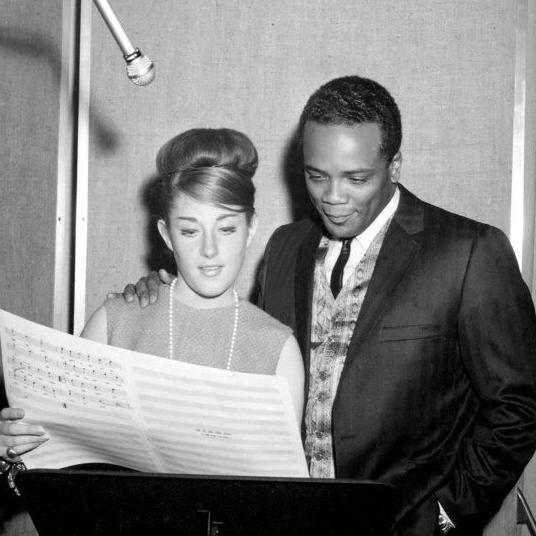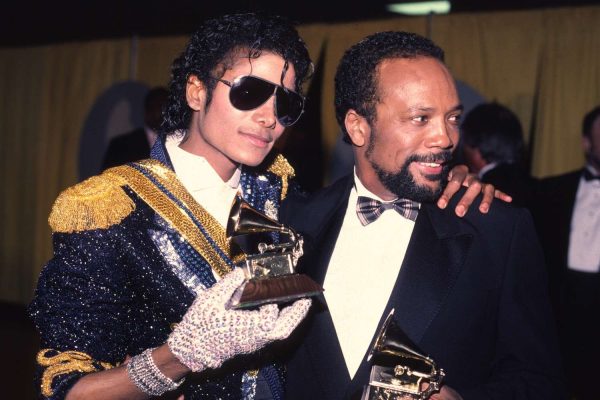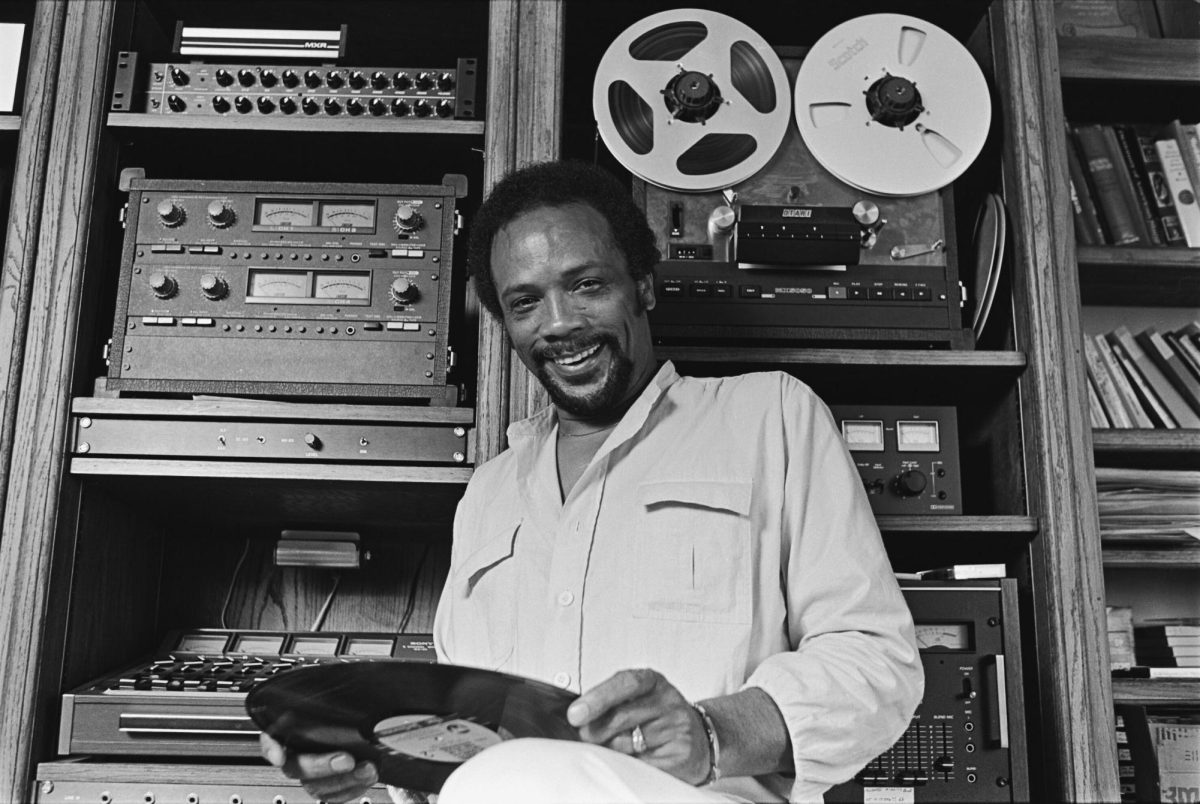World-renowned record producer, songwriter and composer Quincy Jones has passed away at 91 in his Los Angeles home. Throughout his seven-decade-long career, Jones created and produced over 2,900 songs, 300 albums, 52 film and television scores and over 1,000 original compositions. Jones is 1 of 21 people to receive an EGOT (Emmy, Grammy, Oscar, Tony) in their career.
Quincy Delight Jones Jr. was born on March 14, 1933, in a dangerous part of the South Side of Chicago. Growing up, Jones ran with gangs and would carry a knife on him. In the 2018 documentary, “Quincy,” Jones recalled having a rival gang member nail his hand to a fence at the age of seven and a time he took an icepick to the head. At a young age, Jones’ mother, who suffered from schizophrenia, was removed from the home and taken to a psychiatric facility. Needing assistance raising him, Jones’ father took the young boy to live with his mother, an ex-slave from Louisville. Jones recalled she would steal food, and they would often resort to eating possums and rats because “that’s all there was.”
In 1940, Jones’ family fled to Seattle because of the gang violence in Chicago. In high school, Jones broke into an armory and played the piano for the first time, instantly falling in love with the concept of music. He quickly took up playing percussion, trombone, saxophone and more, but had a particular passion for the trumpet. Jones stated he heavily admired Black jazz musicians as they were dignified and proud—something that Black people were not portrayed as at the time—and started playing in jazz clubs at age 14 in 1947. Jones met 16-year-old Ray Charles in these clubs, and they became fast friends. The two would write music together, and Jones would play trumpet during Charles’ shows.
At age 20, Jones traveled around Europe and played 70 nights straight with jazz musician Lionel Hampton and his orchestra. While touring throughout the 1950s, Jones met and performed with Elvis Presley, Frank Sinatra, Sammy Davis Jr. and Count Basie. During this decade, Jones released six solo albums and moved to Paris to learn orchestral arrangement from one of the most talented concertmasters in history, Nadia Boulanger.
In 1961, Jones moved from France to New York City and became the vice president of Mercury Records, making him the first African American to hold this position at a major label company. In 1963, Jones produced Lesley Gore’s “It’s My Party.” This was the first song he had a hand in creating reach number one on the Billboard music charts in America, leading to him producing 18 more hit songs for Gore. In 1964, Jones received his first Grammy for Best Instrumental Arrangement for Don Gibson’s version of “I Can’t Stop Loving You.”

In the latter half of the 1960s into the late 1970s, Jones started arranging, composing and conducting film scores—something highly uncommon for Black people to do at the time—with his first being for the 1965 film “The Pawnbroker.” In 1967, he received his first Oscar nominations for Best Original Score and Best Song—becoming the first African American to be nominated twice in one year. In 1971, Jones was the first Black person to be the musical director and conductor of the Academy Awards.
In 1977, Jones scored the music for the television mini-series “Roots” and received the Emmy Award for Outstanding Music Composition for a Series. A year later, Jones scored the fantasy musical “The Wiz,” which starred Diana Ross and Michael Jackson. Jones was impressed by Jackson’s talent and believed he had what it took to be more than just a child star performing with Jackson 5. When Jackson had asked for producer recommendations, Jones jumped at the chance to create his next album. Together, they produced Jackson’s 1979 album “Off The Wall.”
By the end of 1979, “Off The Wall” had sold over 20 million copies. The duo collaborated again in 1982, creating Jackson’s sixth album, “Thriller.” To this day, “Thriller” is the highest-selling album ever and has gone platinum 34 times. Between 1982 and 1984, Jones was nominated for 13 Grammys for his work with Jackson and his solo releases, winning nine.

Jones was a self-proclaimed workaholic and rarely ever took a break from work despite suffering a brain aneurysm in 1974. Jones followed the success of “Thriller” by producing Donna Summer’s self-titled album in 1982 and scoring Steven Spielberg’s “The Color Purple” in 1985. Jones was a producer on the film and is widely credited as the man who introduced the world to Oprah Winfrey and Whoopi Goldberg. Winfrey wrote on her Instagram after Jones’ passing, “My beloved Q. The world’s beloved Q. The one and only Quincy Jones ‘discovered’ me for ‘The Color Purple’ movie in 1985. My life changed forever for the better after meeting him. I had never experienced, nor have since, anyone who’s heart was so filled with love.”
In 1985, Jones was tasked with conducting and producing the charity song “We Are the World,” created to raise money for Ethiopians experiencing a two-year-long famine. The song featured more than 30 A-list musicians, including Stevie Wonder, Paul Simon, Bob Dylan, Tina Turner, Jackson and four of his siblings. In the song’s release year, $44.5 million had been raised for USA for Africa’s humanitarian fund. By October 1986, the song garnered $51.2 million to fight the famine. It is one of the best-selling singles of all time and won four Grammys in 1986, including Record of the Year and Song of the Year.
A year later, in 1987, Jones produced his final album for Jackson, “Bad.” It is the fastest-selling album of all time, selling over 7 million copies worldwide in the first week of its release. Jones was nominated as Producer of the Year, and “Bad” was nominated for Album of the Year at the 1988 Grammys.
In 1995, Jones was awarded the only Oscar of his career, winning the Jean Hersholt Humanitarian Award for outstanding contributions to humanitarian causes. He received three special Grammy Awards between 1989 and 1996, including the Grammy Legend Award. Jones hit EGOT status in 2016 when he received a Tony for Best Revival of a Musical for “The Color Purple.”
Determined and hardworking, Jones opened the door for many Black Americans and ventured into new endeavors like television, magazines and politics. From 1990 to 1996, Jones composed the music and was an executive producer of the hit show “The Fresh Prince of Bel-Air.” Will Smith, the lead in “Fresh Prince,” shared on Instagram, “Quincy Jones is the true definition of a Mentor, a Father and a Friend. He pointed me toward the greatest parts of myself. He defended me. He nurtured me. He encouraged me. He inspired me. He checked me when he needed to. He let me use his wings until mine were strong enough to fly.”

In his later life, Jones suffered severe health issues and entered a diabetic coma in 2014 from excessive drinking. He also developed a serious blood clot in his leg when he was 82, with doctors telling him he may have to start using a wheelchair. Despite these obstacles, Jones continued to perform live shows around the world late into his career, often bringing out musical legends and friends like Carlos Santana, Mary J. Blige, D’Angelo and more.
Known for his eccentricity and brash interview answers, Jones had a love for astrology and would constantly ask people for their star sign. An endless number of celebrities have paid tribute to Jones since his passing on Sunday evening, including Elton John, Colman Domingo, Al Roker, Vice President Kamala Harris and many more. Former President Barack Obama took to social media, writing, “For decades, Quincy Jones was music. From producing ‘Thriller,’ to composing the score for ‘The Color Purple,’ to working with Frank Sinatra to Ray Charles, it seemed like every big record – and every big film – had Quincy’s name on it. His music appealed to listeners of every race and every age. And by building a career that took him from the streets of Chicago to the heights of Hollywood, Quincy paved the way for generations of Black executives to leave their mark on the entertainment business. Michelle and I send our thoughts to Quincy’s friends, family, and everyone who has lived their lives to his songs.”
Jones’ family released a statement: “He is truly one of a kind and we will miss him dearly; we take comfort and immense pride in knowing that the love and joy, that were the essence of his being, was shared with the world through all that he created. Through his music and his boundless love, Quincy Jones’ heart will beat for eternity.” Jones leaves behind seven children and a musical career that is completely unparalleled.
The Pace Press has put together a playlist of essential Quincy Jones tracks below:






